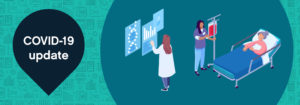The 8th Annual Health Datapalooza conference in Washington D.C. brought together a variety of data advocates who focused on how to harness the power of big data and put it into the hands of the people who benefit from it most: patients and providers. As part of the two-day event, one of our clients – Ian Morris, Clinical Data Interoperability Project Manager for the State of Mississippi, Division of Medicaid – presented as part of a panel titled “Health Systems Reaching Out to Patients and Providers.” During his presentation, Morris shared Medicaid’s experience of modernizing their Medicaid infrastructure and empowering real-time data sharing across all of Mississippi. In addition, Morris outlined lessons learned around interoperability and the roadmap for Medicaid’s interoperability efforts in years to come.
After the conference came to an end, we connected with Morris to discuss his experience at the event and other key takeaways. Morris shares his highlights below.
1. As a first-time attendee and presenter at Health Datapalooza, what intrigued you most about the event?
It was refreshing to hear the patient perspective. A lot of the time when you attend conferences that focus on data and analytics, you don’t get the rich patient narrative. However, Health Datapalooza took the imperative to put democratization of health data at the heart of the event. Empowering the physician and patient to take control of the data is what we’re all striving for, and that’s where organizations like Medicaid fit into the narrative. You need to understand the value of data first, and that’s where we – people such as interoperability managers – come into play. We translate that value, and once it’s understood by the provider, it can be shared externally with the patient.
2. What was a best practice that you learned from your peers and what do you hope to see at next year’s conference?
There were many presentations at the event that delved into the importance of collaborating between multiple state systems (i.e. bridging the broader health and human services, mental health and advocacy groups together) all for the greater good – improving patient outcomes via better data sharing. Such intricate collaboration efforts made me think of the initiatives Medicaid plans to embark on in the future. If there is one take away, it’s that statewide collaboration is key to better data sharing practices. My hope for next year’s conference is to have more speaking panels that touch upon just this, especially as it relates to interoperability efforts overall.
3. Other post-conference highlights that you’d like to share?
Health Datapalooza was full of energetic and enthusiastic data leaders. From patient advocates, to vendors to hands-on project managers, conference attendees and speakers embraced each other’s lessons and shared challenges of their own. Serving as a microcosm of what we’re all striving for in healthcare, Health Datapalooza reminds us that the sharing and analysis of data has a purpose – and that is ultimately to improve patient outcomes.
To read more about how Mississippi Division of Medicaid became the first Medicaid Agency to exchange clinical data summaries with their providers, read their story here. To learn more about how to act on your data and ensure quality, cost-effective care for Medicaid beneficiaries, visit our Provider Access solution here.
Get our take on industry trends
Data visualization: A picture is worth a thousand…healthcare data points?
The amount of data produced daily has grown exponentially with nearly 90% of the world’s data generated in the last two years alone. To ensure we can make sense of this data, analysts must find meaningful ways to present the information to their audiences.
Read on...How did we get here? Hospital analytics and the new normal
I have heard the word “unprecedented” so many times in 2020 that it has lost its significance; many of us have become desensitized to the extraordinary changes in the world this year.
Read on...How to help employer groups plan in a time of uncertainty
Employers and their sponsored health plans are thinking about next year’s benefit designs with a significant challenge not seen before: the effect of the coronavirus pandemic. There are important considerations to take into account before making any decisions about new or existing coverage. Becky Niehus, a director of Product Consulting at MedeAnalytics, explores these new issues and what employers can do to ensure employees are “covered.”
Read on...Healthcare’s return to “normal” after COVID-19: Is it possible?
As providers determine how to get patients to return to facilities for routine disease management and preventive screenings, opportunities are ripe for the application of analytics to triage at the right time to the right setting. Data related to COVID-19 will continue to flow rapidly, but there are possibly more questions than answers now about a return to “normal.”
Read on...



